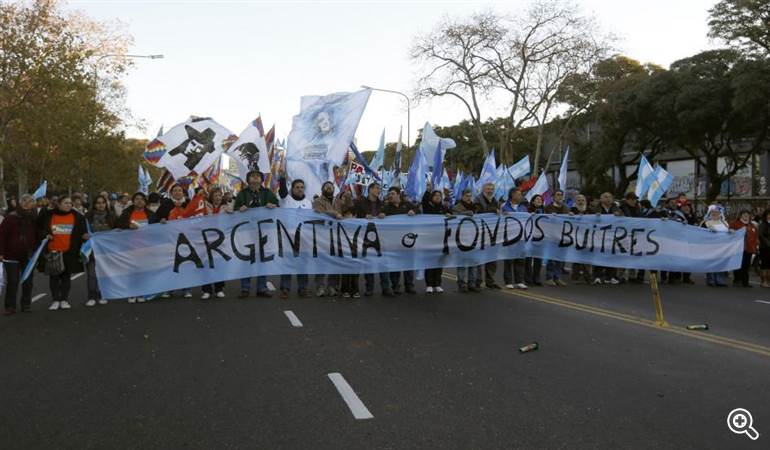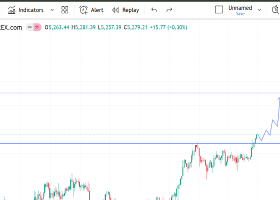The fate of Argentina’s economy now rests on its ability to resolve a dispute with a group of bondholders led by a multibillion-dollar hedge fund.
“Argentina’s professed willingness to negotiate with its creditors has proven to be just another broken promise,” said Jay Newman, a portfolio manager at Elliott Management Corp., a New York hedge fund that specializes in profiting off complex legal disputes that, like in the case of Argentina, often take years to resolve.
The fund’s NML Capital division is leading a group of 19 plaintiffs seeking full payment of their Argentine bonds totaling an estimated $1.5 billion — most of which were bought for cents on the dollar as Argentina slid into default in 2001. Monday marks the country’s second descent into default in 15 years.
“Argentina has refused to negotiate any aspect of this dispute,” Newman stated, breaking his silence for the first time since mediated discussions were attempted last week. “There are no negotiations underway, there have been no negotiations, and Argentina refuses to commit to negotiations in the future.”
A person briefed on the discussions told Newsweek that the talks simply failed to launch, hitting a wall Saturday as Argentina proved inflexible to the hedge funds’ starting point and vice versa.
From the vantage point of Elliott, Argentina’s lawyer have issued demands instead of starting negotiations in earnest, the person said. Special master Daniel Pollack, the court-appointed mediator in the talks, stated last week that the two sides were in communication, but had not reached a settlement.
Elliott’s Newman issued his statement by email Monday, the same day Argentina was due to make a $539 million bond payment to another set of bondholders who agreed to partial payments on their bonds years ago – unlike the hedge fund “holdout” group led by Elliott Management.
Under U.S. law, Argentina cannot legally pay one bondholder group without paying the other. Argentina’s dispute with this “equal treatment” finding by a U.S. District Court was the subject of a Supreme Court appeal rejected by the high court two weeks ago, which brought the long-simmering dispute to a head.
If Argentina does not pay both bondholder groups Monday, it triggers a 30-day grace period that will force the country into default July 30 if it does not come up with all of the funds in time.
In the wake of the Supreme Court’s rejection of Argentina’s case, the country’s president, Cristina Kirchner, vowed in a national broadcast earlier this month not to “submit the country to such extortion” by what she called “the vulture funds.”
Part of Argentina’s argument against paying the holdout hedge funds in full is that this could land it in a legal quandary where it may have to do the same for the rest of its bondholders, most of whom agreed in 2005 and 2010 to reduced bond payments under an exchange agreement. If this happens, Kirchner estimated, it could cost the nation as much as $15 billion, which it cannot afford. (Elliott Management disputes this, putting the number at closer to $6 billion.)
“It’s our obligation to take responsibility for paying our creditors, but not to become the victims of extortion by speculators,” Kirchner said in her national broadcast.
In an effort to pay the exchange bondholders accepting partial payment – and exclude the holdout bondholders such as Elliott Management – Argentina transferred $539 million to bond administrator Bank of New York Mellon Corp. last week, provoking the ire of District Court Judge Thomas Griesa.
The judge had forbade Argentina from paying just the exchange bondholders and not the holdouts as part of an injunction that bound Argentina under the bonds' antiquated "pari passu" provision, a Latin term meaning "with an equal step," buried in the original bonds' fine print. This clause is the real reason why the fate of the holdout bondholders is tied to that of the exchange bondholders, who have strenuously objected to being held hostage to these proceedings.
Calling the financial transfer an “explosive action” that could up-end settlement talks with the hedge fund-led bondholders such as Elliott, Judge Griesa demanded that Bank of New York Mellon return the funds to Argentina until it could pay both sets of bondholders.
Much is at stake for Argentina, as its refusal to pay the hedge fund-led holdouts, which include heavyweight New York hedge fund Aurelius Capital Management, could decimate the country's chances for financial recovery.
In addition, there could be dire consequences for the exchange bondholders who only reluctantly agreed to reduced payments from Argentina and now are getting nothing.
In court proceedings last year, David Boies, a lawyer representing the exchange bondholders, told a panel of judges reviewing Griesa's injunction that if Argentina defaults, it would destroy the value of the bonds. "It's going to be terrible for my clients," he told the panel. Turning to the lawyer for Elliott's NML division, he said: "They're going to profit from the default."
The past two week’s events do not bode well for Argentina, which faces heightened potential for financial ruin no matter what it does.
With Argentina still attempting to defy the U.S. court orders, resisting negotiations and taking out ads in major newspapers casting its opponents in a negative light, it is increasingly looking like the 30-day grace period may be for naught and the already financially troubled country may skid into default.
Over the weekend, Argentina made it clear to the hedge fund-led holdout group that it would not proceed with negotiations unless the equal treatment provision on its bonds was lifted indefinitely and Argentina could make its $539 million payment to the exchange bondholders Monday – but not the holdout group, according to the person briefed on the discussions. Without strong legal protections in place, that wasn’t a viable option for Elliott Management and the rest of the holdout group, this person said. The demands of each side left talks at a standstill.
“Argentina’s government has chosen to put the country on the brink of default,” Newman said. “We sincerely hope it reconsiders this dead-end path.”




